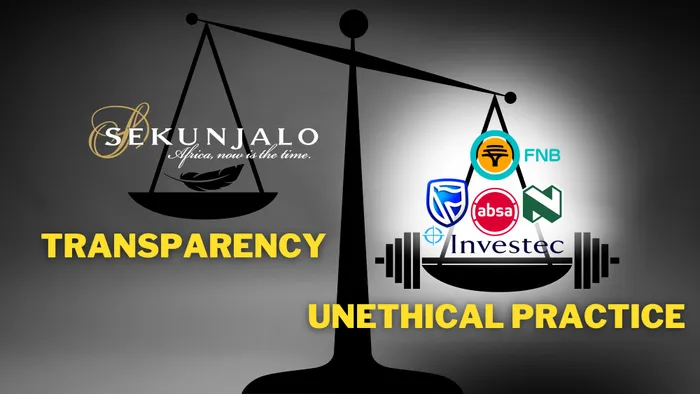Banks Shockingly Admit They Have No Documents to Justify Sekunjalo Bank Account Closures

By Edmond Phiri
A recent Western Cape High Court hearing of the Sekunjalo plea to compel banks to provide information leading to their decision to close bank accounts left a shocking revelation.
Major South African banks such as the Nedbank and others have startlingly admitted to the absence of documents or procedural justification for the closure of bank accounts belonging to the Sekunjalo Group and its associated companies.
The admission by the banks not only raises profound concerns about the transparency and fairness of banking practices but also echoes a troubling trend witnessed globally—highlighted by the Nigel Farage case in the UK, where the Banking Ombudsman’s findings about bank conduct have ignited debates about the powers wielded by financial institutions.
Sekunjalo Group, a conglomerate with around 200 companies under its umbrella servicing various industries across South Africa, petitioned the court for disclosure after a harrowing three years of being unfairly unbanked.
The group’s legal battle to compel banks to disclose the process that led to their banks’ decision to terminate services has unveiled a shocking reality: the banks’ decision-making processes are shrouded in secrecy, with no accountability.
During the legal proceedings in the Western Cape High Court, it was revealed that the banks could not produce any critical documents, such as “Customer Due Diligence rules”, “Risk Management and Compliance Programme policies” or even minutes and recordings of meetings that led to their decision to unbank Sekunjalo.
This lack of documentation is not just a procedural failure but also a grave departure from the principles of justice, fairness, and accountability that should govern financial institutions.
The banks’ argument, as presented in court, was that Sekunjalo had not sufficiently made a case for the production of documents in their founding affidavit. Furthermore, they claimed that the requested documents were either unnecessary for the purpose of pleading or did not exist at all, including crucial minutes and recordings of meetings that led to the decision to terminate Sekunjalo’s banking services.
The banks’ legal stance, however, belies a deeper issue that transcends the specifics of the Sekunjalo case. It reflects a systemic problem where banks, acting as de facto arbiters of economic viability, can arbitrarily decide the fate of companies without clear, transparent, and justifiable criteria. Judge Hathorn’s observation that Sekunjalo and the courts should not simply take the banks’ word without scrutinising the underlying documents further highlighted the need for a more accountable and transparent financial system.
The Sekunjalo is alarmingly reminiscent of the Farage case in the UK, where prominent politician Nigel Farage was unbanked in a move that sparked public and political outcry.
UK Banking Ombudsman’s subsequent scrutiny of the banks’ conduct highlighted a glaring need for a balance between banks’ risk management practices and the rights of individuals and entities to fair treatment. The key outcomes of this case have emphasised the importance of transparency and the necessity for banks to have substantiated reasons for their actions, especially when those actions have far-reaching implications on individuals’ and companies’ economic participation and rights.
South African banks’ admission that they had no documents to justify their actions against Sekunjalo remains shocking, to say the least. This startling lack of documentation and justification for the account closures begs the question: who, then, instructed the banks to close the accounts of Sekunjalo Group and its associated companies?
Sekunjalo, its directors, shareholders, and its associated companies have had no corruption cases before law enforcement agencies and state institutions.
At minimum, the decision to close the bank accounts of entities managing funds amounting to hundreds of millions, if not billions, should be predicated on solid, defensible reasons supported by transparent due process and accessible documentation. This situation underlines a broader issue of arbitrary power exercised by banks, reminiscent of the concerns raised in the Farage case and its aftermath.
Banks operate within a regulated framework, purportedly to ensure fairness, accountability, and transparency in their dealings with the public. However, the refusal or inability to produce documents or demonstrate a clear and lawful process in deciding to unbank a client goes against these principles and raises questions about the integrity of the financial system as a whole.
It suggests that banks may operate with a level of discretion that borders on arbitrariness, impacting not just the entities involved but also the very fabric of economic justice and media freedom, as evidenced by the targeting of Sekunjalo and Independent Media.
The need for a robust regulatory response is more pressing than ever. Just as the Farage case prompted a re-evaluation of banking practices and regulatory oversight in the UK, the Sekunjalo case should act as a catalyst for similar scrutiny and reform in South Africa and elsewhere. Regulators and policymakers must ensure that financial institutions cannot hide behind vague notions of “reputational risk” to justify actions that have significant economic and societal impacts.
What makes the banks’ actions even more egregious is the regulatory environment within which they operate. Banks are not a law unto themselves; they are subject to international and domestic regulations. The implications of the Sekunjalo appeal to information case are far-reaching.
* Edmond Phiri is an independent commentator and analyst.
** The views expressed do not necessarily reflect the views of IOL or Independent Media.